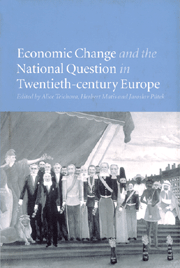Book contents
- Frontmatter
- Contents
- List of figures
- List of tables
- Notes on contributors
- Acknowledgements
- Introduction
- 1 Nationalism and the economic question in twentieth-century Ireland
- 2 Economic aspects of the nationality problem in nineteenth- and twentieth-century Belgium
- 3 The economy as a pushing or retarding force in the development of the German question during the second half of the twentieth century
- 4 Lusatian Sorbs in Germany before the Second World War: the influence of the economy on the national question
- 5 Unequal regional development in Switzerland: a question of nationality?
- 6 The Portuguese national question in the twentieth century: from Spanish threat to European bliss
- 7 From autarky to the European Union: nationalist economic policies in twentieth-century Spain
- 8 The economic background to the Basque question in Spain
- 9 Economic change and nationalism in Italy in the twentieth century
- 10 National integration and economic change in Greece during the twentieth century
- 11 National identity and economic conditions in twentieth-century Austria
- 12 Economic, social and political aspects of multinational interwar Czechoslovakia
- 13 Nationality and competition: Czechs and Germans in the economy of the First Czechoslovak Republic (1918–1938)
- 14 Economic aspects of Slovak national development in the twentieth century
- 15 Economic change and national minorities: Hungary in the twentieth century
- 16 Economic background to national conflicts in Yugoslavia
- 17 Economic differentiation and the national question in Poland in the twentieth century
- 18 Economy and ethnicity in the hands of the state: economic change and the national question in twentieth-century Estonia
- 19 Changing structure and organisation of foreign trade in Finland after Russian rule
- 20 Economic change and the national question in twentieth–century USSR/Russia: the enterprise level
- Index
13 - Nationality and competition: Czechs and Germans in the economy of the First Czechoslovak Republic (1918–1938)
Published online by Cambridge University Press: 01 September 2009
- Frontmatter
- Contents
- List of figures
- List of tables
- Notes on contributors
- Acknowledgements
- Introduction
- 1 Nationalism and the economic question in twentieth-century Ireland
- 2 Economic aspects of the nationality problem in nineteenth- and twentieth-century Belgium
- 3 The economy as a pushing or retarding force in the development of the German question during the second half of the twentieth century
- 4 Lusatian Sorbs in Germany before the Second World War: the influence of the economy on the national question
- 5 Unequal regional development in Switzerland: a question of nationality?
- 6 The Portuguese national question in the twentieth century: from Spanish threat to European bliss
- 7 From autarky to the European Union: nationalist economic policies in twentieth-century Spain
- 8 The economic background to the Basque question in Spain
- 9 Economic change and nationalism in Italy in the twentieth century
- 10 National integration and economic change in Greece during the twentieth century
- 11 National identity and economic conditions in twentieth-century Austria
- 12 Economic, social and political aspects of multinational interwar Czechoslovakia
- 13 Nationality and competition: Czechs and Germans in the economy of the First Czechoslovak Republic (1918–1938)
- 14 Economic aspects of Slovak national development in the twentieth century
- 15 Economic change and national minorities: Hungary in the twentieth century
- 16 Economic background to national conflicts in Yugoslavia
- 17 Economic differentiation and the national question in Poland in the twentieth century
- 18 Economy and ethnicity in the hands of the state: economic change and the national question in twentieth-century Estonia
- 19 Changing structure and organisation of foreign trade in Finland after Russian rule
- 20 Economic change and the national question in twentieth–century USSR/Russia: the enterprise level
- Index
Summary
THE BASIC SITUATION
The nationality issue
The nationality issue was an element of cardinal importance in the political, economic and social life of the First Czechoslovak Republic. The background of this issue was the presence of a strong native German population (‘Volksgruppe’) in a state that defined its identity not as multinational but as the state of the Czechoslovaks. To some extent, the Germans were conceived of as a menace to this identity and as a threat to the newly gained national independence. These statements are very general; they only characterise mainstream or average attitudes. The Volkstumskampf (‘ethnic struggle’), as it was called by contemporaries, characterised the First Republic from its foundation in the autumn of 1918 until its end following the Treaty of Munich. However, talking about conflict alone would draw a strongly distorted picture. Reality was characterised by a complex mixture of antagonism and cooperation. The result was a modus vivendi – sometimes arduous but viable on the whole. The element of conflict was predominant in the first years after the First World War. It faded into the background in the second half of the 1920s when the ‘activist’ German parties – that is, those that professed to be loyal to the state – co-operated with the Czech parties and participated in government.
- Type
- Chapter
- Information
- Publisher: Cambridge University PressPrint publication year: 2000

